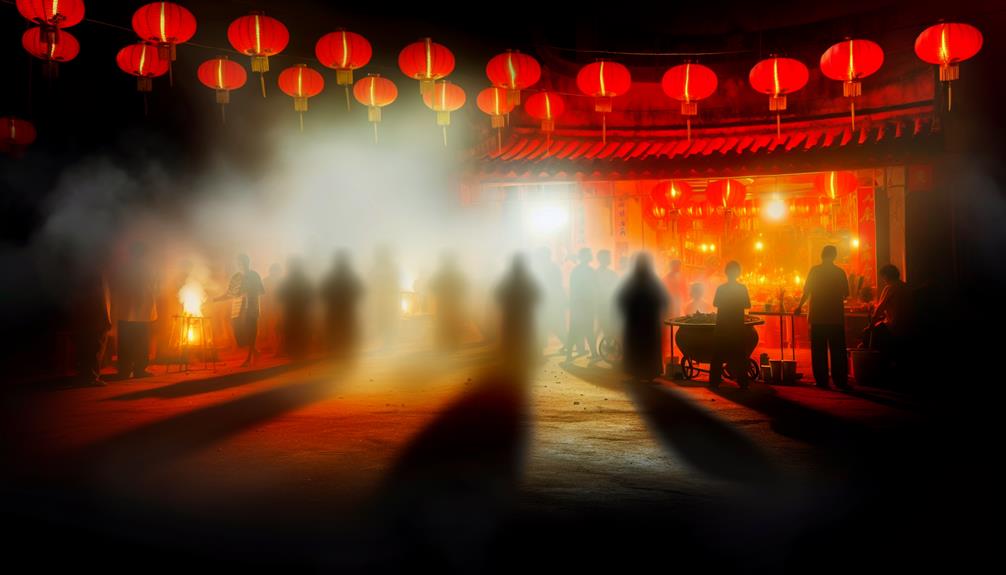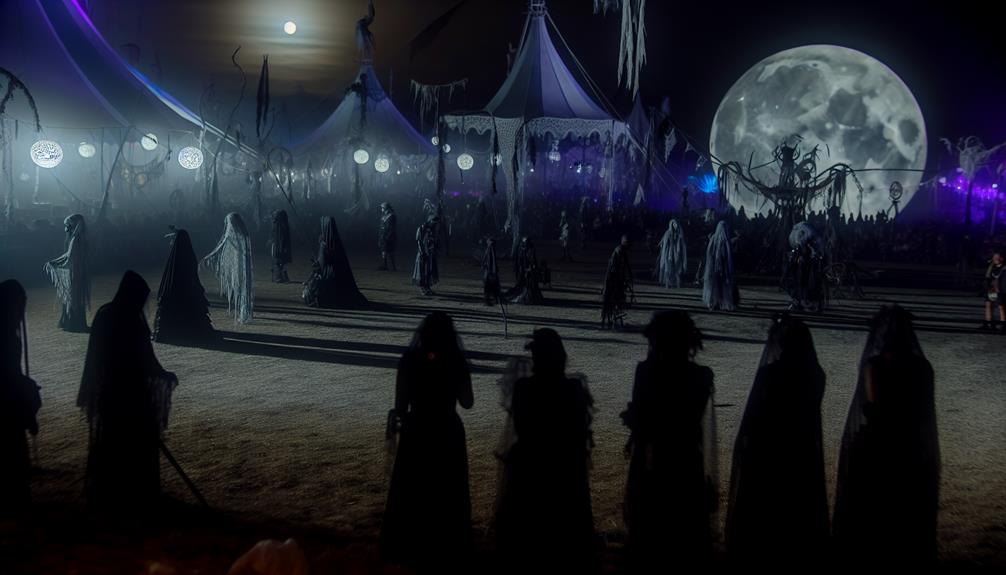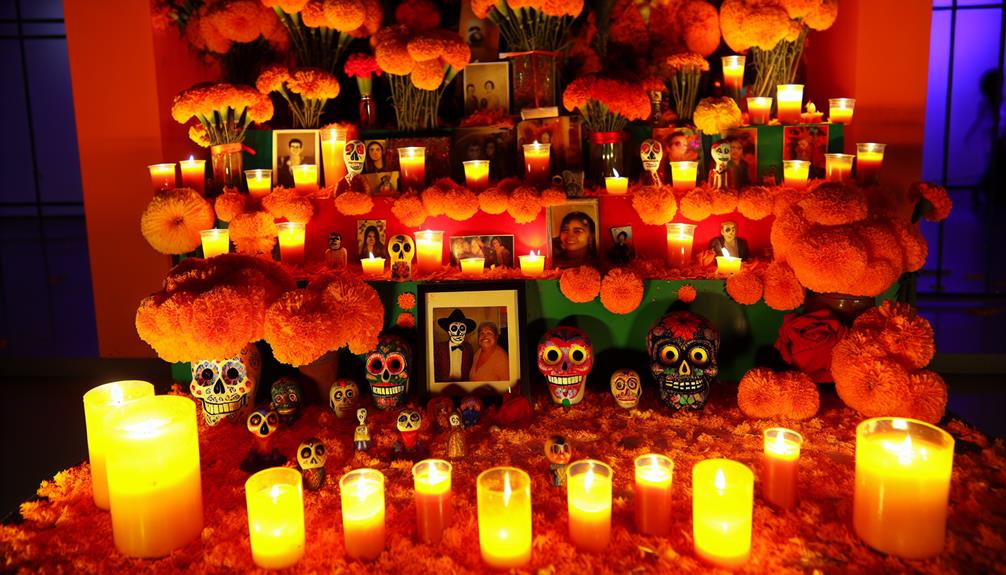The Hungry Ghost Festival in China, a time-honored tradition steeped in cultural heritage, draws attention to the intricate tapestry of beliefs and practices that have endured through generations. As the veil between the worlds of the living and the dead thins during this auspicious time, intricate rituals and offerings play a pivotal role in appeasing spirits and ensuring blessings for the living. However, beyond the surface of these practices lies a deeper significance that reveals the complexities of Chinese spirituality and the profound impact of honoring ancestors. This festival serves as a gateway to exploring the profound connections between the earthly and spiritual worlds, offering a glimpse into a world where tradition and belief intersect in captivating ways.
Key Takeaways
- Festival in China honoring deceased spirits.
- Blends Taoism, Buddhism, and folklore.
- Offerings made for harmony and blessings.
- Spans seventh lunar month, starts August 22.
- Includes rituals, offerings, lantern processions.
Origins and History
The origins and history of the Hungry Ghost Festival in China trace back centuries, intertwining cultural beliefs with historical events that have shaped its significance today. This traditional Chinese festival, also known as Yu Lan Jie, has deep roots in folklore tales and legends. One such legend revolves around Moggallana, a disciple of Buddha, who used his supernatural powers to save his mother from the domain of hungry ghosts during the seventh lunar month.
Over time, the Hungry Ghost Festival has undergone evolution and changes, adapting to the cultural context of different regions in China. Initially, it was a way to honor and appease the spirits of the deceased, ensuring their well-being in the afterlife. However, as beliefs and practices shifted, the festival also became a time to pay respects to ancestors and seek blessings for the living.
The festival's evolution has been influenced by various factors, including historical events and societal developments. With the blending of Taoism, Buddhism, and Confucianism, the Hungry Ghost Festival has become a rich tapestry of rituals and traditions that reflect the diversity of Chinese culture. Despite the changes over the centuries, the essence of honoring the dead and showing gratitude to ancestors remains at the core of this auspicious occasion.
Significance and Beliefs
Rooted in ancient Chinese traditions and spiritual beliefs, the Hungry Ghost Festival holds profound significance in Chinese culture. This festival is a time when people pay respect to deceased ancestors and wandering spirits from the underworld. Beliefs surrounding the Hungry Ghost Festival stem from a mix of Taoism, Buddhism, and Chinese folklore. According to tradition, during the seventh month of the lunar calendar, the gates of the underworld open, allowing spirits to roam the earth. It is believed that these spirits may be vengeful or lost, seeking food, money, or attention from the living.
The Hungry Ghost Festival serves as a way to honor and appease these spirits, ensuring harmony and good fortune for the living. Offerings of food, incense, and fake money are made to the spirits, and elaborate ceremonies take place to provide them with comfort and release. Through these rituals, Chinese communities seek to show respect for the deceased and protect themselves from any potential harm that the spirits may bring.
Folklore and legends surrounding the festival add to its mystique and cultural importance. Stories of wandering spirits and haunted territories are shared during this time, deepening the connection between the living and the dead. The Hungry Ghost Festival is not only a time of remembrance but also a period of spiritual reflection and communal unity.
Date and Duration
Incorporated into the lunar calendar, the Hungry Ghost Festival typically spans the entire seventh month. In 2022, the festival will commence on August 22nd and last for 15 days. This period holds significant cultural importance in Chinese traditions, where families gather to honor their deceased ancestors and wandering spirits.
To provide a clearer understanding of the festival's duration, the table below outlines the key dates and activities during the Hungry Ghost Festival:
| Date | Activity |
|---|---|
| August 22 | Beginning of the Hungry Ghost Festival |
| August 29 | Offerings of food and incense to appease spirits |
| September 6 | The peak of the festival, grand ceremonies held |
| September 13 | Burning of joss paper for ancestors' journey back |
| September 15 | End of the Hungry Ghost Festival |
During this time, various cultural traditions are observed, such as setting up altars at homes and temples, burning incense, and preparing elaborate meals for the spirits. Festive foods like rice dumplings and fruits are offered to pacify the wandering ghosts and secure blessings for the living. The Hungry Ghost Festival not only serves as a period of remembrance but also highlights the interconnectedness between the living and the deceased in Chinese culture.
Rituals and Offerings
Symbolizing a deep connection to ancestral spirits and a reverence for tradition, the Hungry Ghost Festival in China is marked by intricate rituals and elaborate offerings. This traditional festival, also known as Yu Lan Jie, is a time when Chinese communities honor deceased ancestors and wandering spirits. One of the key traditional practices during this period is the belief that the gates of the afterlife are opened, allowing spirits to roam the earthly world. To appease these spirits and safeguard their well-being, various rituals and offerings are made.
Food offerings play a central role in the Hungry Ghost Festival. Families prepare elaborate feasts with dishes like rice, fruits, and other delicacies to offer to their ancestors. These offerings are placed on altars or tables as a sign of respect and to provide nourishment for the spirits. In addition to food, incense, and candles are also lit to guide the spirits and create a welcoming atmosphere.
Throughout the festival, special ceremonies and performances are held to entertain and appease the spirits. These may include traditional Chinese opera, music, and dance. The entire community comes together to participate in these rituals, fostering a sense of unity and shared cultural identity. The Hungry Ghost Festival is a time-honored tradition that highlights the importance of remembering and honoring ancestors in Chinese culture.
Festivities and Events
The festivities and events of the Hungry Ghost Festival in China showcase a rich tapestry of cultural traditions and community celebrations. During this time, traditional customs are honored and passed down through generations, creating a sense of continuity and belonging among participants. One of the central aspects of the festival is the preparation and offering of delicious food to appease the spirits. Families gather to prepare elaborate meals, including favorite dishes of the deceased, as a way to show respect and guarantee their ancestors' comfort in the afterlife.
In addition to the culinary traditions, the Hungry Ghost Festival features a variety of events that bring communities together. The most prominent of these events is the staging of Chinese opera performances and puppet shows. These vibrant and colorful performances entertain both the living and the spirits, with elaborate costumes and dramatic storytelling adding to the festive atmosphere. Additionally, lantern processions illuminate the streets, guiding the spirits to their offerings and providing a visual spectacle for onlookers.
Taboos and Superstitions
Taboos and superstitions surrounding the Hungry Ghost Festival in China hold significant cultural importance and influence various aspects of community behavior and beliefs. During this time, food taboos play an essential role in guiding the community's actions. One common belief is that offering food to spirits should be done with utmost care and respect, as failing to do so may anger the spirits and bring misfortune. This belief leads to certain taboos, such as not taking home food offerings left out in the open for the spirits, as it is considered disrespectful and could invite paranormal disturbances.
Paranormal beliefs are deeply rooted in the Hungry Ghost Festival traditions. Many people avoid staying out late at night during this period, fearing encounters with wandering spirits. It is believed that during the festival, the veil between the living and spirit worlds is thin, increasing the likelihood of paranormal encounters. As a result, communities often adhere to various superstitions to protect themselves from malevolent spirits, such as avoiding certain activities or places deemed to be haunted.
Lanterns and Bonfires
During the Hungry Ghost Festival in China, the illumination of lanterns and the kindling of bonfires serve as integral cultural practices that symbolize the community's efforts to guide and honor ancestral spirits. Lantern making is a revered tradition during this festival, with intricate designs and vibrant colors adorning the streets and homes. These lanterns are believed to act as beacons, guiding the spirits of the deceased back to the world of the living during this special time.
Bonfires hold a significant role during the Hungry Ghost Festival as well. Communities come together to light large bonfires, symbolizing the cleansing of negative energy and the burning away of any malevolent spirits that may be wandering the earth. The flames are thought to provide warmth and light to the spirits, ensuring they find their way back to the afterlife peacefully.
In some regions of China, fire dancing is incorporated into the festival celebrations. Fire dancers mesmerize onlookers with their skillful movements, twirling and spinning flaming torches to ward off evil spirits and bring good luck to the community. This ancient art form adds a sense of mystery and excitement to the festival, enchanting audiences and participants alike. The combination of lanterns, bonfires, and fire dancing creates a visually stunning and spiritually significant experience during the Hungry Ghost Festival in China.
Cultural Performances
Lantern making and bonfires set the stage for a variety of mesmerizing cultural performances that grace the Hungry Ghost Festival in China. During this vibrant celebration, the streets come alive with the enchanting sights and sounds of traditional dances and theatrical performances that fascinate audiences and honor the spirits of the deceased.
- Traditional Dances: The festival showcases a rich tapestry of traditional Chinese dances, each telling a unique story through graceful movements and colorful costumes. From the elegant movements of the fan dance to the spirited rhythms of the dragon dance, these performances pay homage to China's rich cultural heritage.
- Theatrical Performances: Intricate plays and skits are performed by talented actors, bringing to life ancient tales and legends that have been passed down through generations. These theatrical performances often blend humor, drama, and music to create a captivating experience for spectators.
- Music and Chants: The air is filled with melodious tunes and rhythmic chants that accompany the performances, adding an extra layer of depth and emotion to the cultural festivities. These traditional melodies evoke a sense of nostalgia and reverence for the spirits being honored during the Hungry Ghost Festival.
- Acrobatic Displays: Awe-inspiring acrobats showcase their agility and skill, mesmerizing onlookers with gravity-defying stunts and daring feats. The acrobatic displays add an element of excitement and wonder to the festival, leaving the audience in amazement at the performers' incredible talents.
Modern Observance and Adaptations
In contemporary times, the Hungry Ghost Festival in China has undergone significant modern observances and adaptations, reflecting the evolving cultural landscape and societal trends. Modern practices during the festival now include electronic offerings such as virtual gifts and online dedications, catering to the tech-savvy younger generation. These innovations demonstrate a fusion of traditional beliefs with modern technology, showcasing how cultural rituals have adapted to the digital age.
Moreover, cultural changes have influenced the way the Hungry Ghost Festival is observed in urban versus rural areas. In cities, where space is limited, community gatherings and performances may take place in designated areas like parks or community centers. On the other hand, in rural settings, the festival may retain more traditional elements such as elaborate processions through village streets and offerings made in ancestral homes.
The modern observance of the Hungry Ghost Festival also includes environmental considerations. In an era where sustainability is a growing concern, efforts are being made to reduce waste generated during the festival. This has led to the promotion of eco-friendly practices such as using biodegradable materials for offerings or opting for digital tributes instead of burning physical items. These changes reflect a conscientious shift towards preserving the environment while honoring cultural traditions.
Frequently Asked Questions
How Do Hungry Ghosts Differ From Regular Ghosts in Chinese Culture?
In Chinese culture, hungry ghosts are distinguished from regular ghosts by their insatiable appetites and restless nature. Unlike regular ghosts, hungry ghosts are believed to be spirits of individuals who have died with unresolved issues, leading them to wander aimlessly in search of fulfillment.
Ritual practices, overseen by spiritual leaders, are often conducted to appease these hungry ghosts and provide them with offerings to ease their suffering and help them find peace in the afterlife.
Are There Any Specific Foods That Are Forbidden to Offer During the Festival?
Forbidden foods play a significant role in various cultural practices, with specific items being avoided for various reasons.
In certain traditions, the prohibition of certain foods during rituals or festivals is rooted in symbolic meanings and beliefs. Understanding the cultural significance behind these forbidden foods provides insight into the values and customs of the community observing these practices.
This aspect adds depth and meaning to the rituals and helps maintain the traditions over time.
Can Outsiders Participate in the Rituals and Ceremonies of the Hungry Ghost Festival?
Outsider participation in traditional ceremonies offers a unique opportunity for cultural understanding and mutual respect. Observing such rituals can foster a sense of connection and empathy, bridging gaps between different communities.
By engaging with these practices, outsiders can gain insights into the values and beliefs of the host culture, promoting a spirit of inclusivity and shared experience.
This exchange of traditions can enrich perspectives and promote a deeper understanding of diverse customs and beliefs.
What Role Do Mediums and Spiritual Leaders Play During the Festival?
Mediums and spiritual leaders play vital roles during rituals by channeling messages from the spiritual world and providing guidance to participants seeking spiritual assistance. Mediums act as intermediaries between the living and the deceased, facilitating communication and offering insights into the supernatural.
Spiritual leaders lead ceremonies, offering wisdom and overseeing the proper execution of rituals to guarantee the spiritual well-being of participants. Their presence and guidance are essential for the festival's spiritual significance and success.
How Has Technology and Social Media Influenced the Modern Observance of the Festival?
In the modern era, technology and social media have greatly impacted traditional observances, including the integration of virtual offerings and online rituals.
Social media platforms have created a digital space for participants to share experiences, connect with others, and spread awareness about the festival.
The convenience of virtual offerings has made it easier for individuals to participate from afar, expanding the reach and influence of the festival beyond physical boundaries.
Conclusion
The Hungry Ghost Festival in China is a time of reverence for ancestors and spirits. It showcases a complex blend of cultural traditions and spiritual beliefs. Despite its solemn purpose, the festival also offers a vibrant display of community celebrations and rituals.
In a world where the living seek to honor the dead, the Hungry Ghost Festival serves as a reminder of the interconnectedness between the past and present. It bridges the gap between the seen and unseen worlds.


